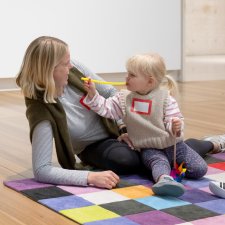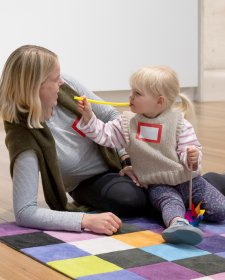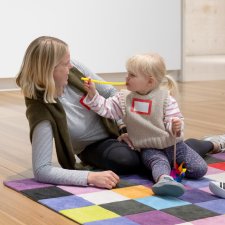Kate Grenville reads a passage from her novel The secret river and describes its creation.
This video was produced with funds donated by Tim Fairfax AC.
Kate Grenville reads a passage from her novel The secret river and describes its creation.
This video was produced with funds donated by Tim Fairfax AC.
My name's Kate Grenville, and I'm going to read from The Secret River.
The Alexander, with its cargo of convicts, had bucked over the face of the ocean for the better part of a year. Now it had fetched up at the end of the earth. There was no lock on the door of the hut where William Thornhill, transported for the term of his natural life, was passing his first night in His Majesty's penal colony of New South Wales. There was hardly a door, barely a wall: only a flap of bark, a screen of sticks and mud. There was no need of lock, of door, of wall: this was a prison whose bars were ten thousand miles of water.
Through the doorway of the hut he could feel the night, huge and damp, flowing in and bringing with it the sounds of its own life: tickings and creakings, small private rustlings, and beyond that the soughing of the forest, mile after mile.
When he got up and stepped out through the doorway there was no cry, no guard: only the huge living night. The air moved around him, full of rich dank smells. Trees stood tall over him. A breeze shivered through the leaves, then died, and left only the vast fact of the forest.
He was nothing more than a flea on the side of some enormous quiet creature.
It seemed at first to be his fancy, that the darkness was moving in front of him. It took a moment to understand that the stirring was a human, as black as the air itself. His skin swallowed the light and made him not quite real, something only imagined.
He took a step towards Thornhill so that the parched starlight from the sky fell on his shoulders. He wore his nakedness like a cloak. Upright in his hand, the spear was part of him, an extension of his arm.
Clothed as he was, Thornhill felt skinless as a maggot. The spear was tall and serious. To have evaded death at the end of the rope, only to go like this, his skin punctured and blood spilled beneath these chilly stars!
Anger, that old familiar friend, came to his side. Damn your eyes be off, he shouted. Go to the devil! After so long as a felon, hunched under the threat of the lash, he felt himself expanding back into his full size. His voice was rough, full of power, his anger a solid warmth inside him.
He took a threatening step forward. He could make out chips of sharp stone in the end of the spear. It would not go through a man neat like a needle. It would rip its way in. Pulling it out would rip all over again. The thought fanned his rage. Be off! Empty though it was, he raised his hand against the man.
The mouth of the black man began to move itself around sounds. And in the fluid rush of speech Thornhill suddenly heard words. Be off, the man was shouting. Be off! It was his own tone; they were his own words, exactly.
Thornill was close enough now that he could see the man's eyes catching the light under their heavy brows, and the straight angry line of his mouth. His own words had all dried up, but he stood his ground.
He had already died once, in a manner of speaking, at the end of the rope. He could die again. He had been stripped of everything already: he had only the dirt under his bare feet, his small grip on this unknown place. He was not about to surrender it to any naked black man.
In the silence between them the breeze rattled through the leaves. He glanced back at the hut, and when he looked again the man was gone. The darkness in front of him whispered and shifted, but there was only the forest. It could hide a hundred black men with spears, a thousand, a whole continent full of men with spears and that grim line to their mouths.
Yes, The Secret River is based on my great-great-great-grandfather, who was a convict who came to Australia in 1806. The family story has it that he got his freedom quite quickly, which a lot of them often did. And he then went up the Hawkesbury river, which is just outside Sydney. And the family story has it that he then 'took up land', was the phrase that they always used. So he settled on this piece of fabulous river-front land and proceeded to make a lot of money. And he died a very rich man.
And when the walk for reconciliation happened in the year 2000 I suddenly realised that my ancestor would be a kind of representative way to tell that story. What I wanted to tell was: what reality lay behind that innocent phrase 'took up land'. It sounds so innocent, as if the land was just lying there to be kind of taken. I knew by then enough about the real Australian history that that was not the case – that land was taken by violence, all over Australia. So in The Secret River, I wanted to tell, as far as I could, what it must have really been like, warts and all, even though that story has its very uncomfortable and confronting aspects.
So I think what I'm most proud of is that I went into that dark place, which for me was a very difficult personal journey, and wrote a book that I thought nobody would much like, because it was controversial and difficult. I feel really proud that I did that, and perhaps was part of an opening up for other people then to tell more versions of that story, so that it's now becoming well-known. We can no longer pretend that we don't know that stuff.



Drop into the Gallery any time for free creative activities inspired by artist Thom Roberts and his exhibition, The Immersive World of Thom Roberts.



Join us for Portrait Play these school holidays as we explore portraits and music. Come and meet the people that live on our walls, discover musical instruments hidden in the portraits and get creative on your journey through the galleries.



Do we have a treat for the smaller humans in your life! Little Faces is for babies and toddlers (with their grown up) to play, sing and have fun discovering a portrait together.